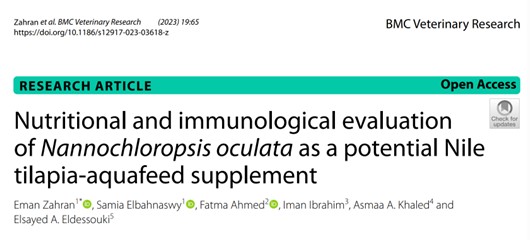Nannochloropsis oculata (N. oculata) is a marine microalga containing bioactive compounds and a high omega-3 polyunsaturated fatty acid (ω-3 PUFAs). Therefore, it is very promising for nutraceutical and the functional food industry applications. Three groups of Nile tilapia (forty-five fish/group) were fed on basal diets or diets containing 5% (N5) or 10% (N10) of the microalga N. oculata for seven weeks. Fish growth performance, proximate composition, and lipid (fatty acids/ FAs and lipoproteins) profile were estimated. In addition, the expression pattern of some lipid metabolism and immune-relevant genes were assessed. An enhancement in whole-body crude protein and growth indices of Nile tilapia was observed on both the supplemented groups N5 and N10. Higher levels of high-density lipoproteins (HDL); and lower levels of the low-density lipoproteins (LDL) were evident in both supplemented groups, while the cholesterol and triglycerides (TG) levels were similar among groups. Ω-3 PUFAs were the significant FAs profile of tilapia fed on N. oculata-supplemented diets in terms of eicosapentaenoic acid, docosahexaenoic acid, and n3/n6 ratio. Concerning the gene expression pattern, heat-shock protein70, glutathione-S-transferase, glutathione peroxidase, and interleukin-1β (IL-1β) were elevated significantly in both supplemented groups. IL-10 is only upregulated in the N10 group. The lipid metabolism-related gene expression showed downregulation of only fatty acid synthase (FAS) in both supplemented groups, with no statistical changes in Peroxisome proliferator-activated receptor alpha (PPARα). Tumor necrosis factor-α (TNF-α), Transforming growth factor-β1 (TGF-β1), and the apoptotic-related genes [caspase3 and Proliferating cell nuclear antigen (PCNA)] showed significant changes among groups. The histopathological examination of the intestine, liver, and spleen supports our findings and confirms the benefits and safeness of N. oculata dietary inclusion. Collectively, N. oculata is a very promising nutraceutical for improving fish health and sustainability of aquaculture production.


